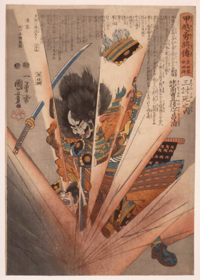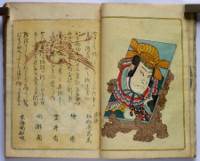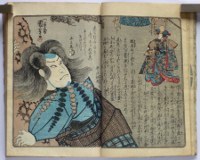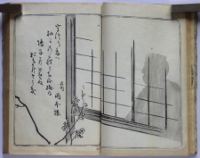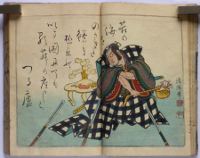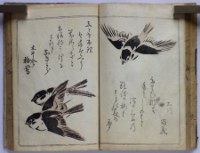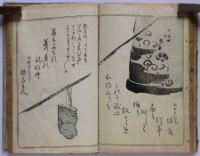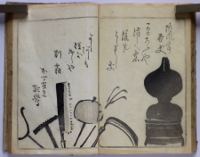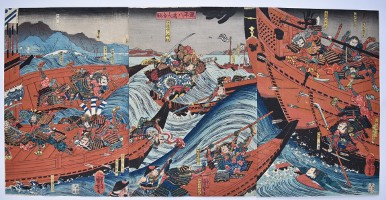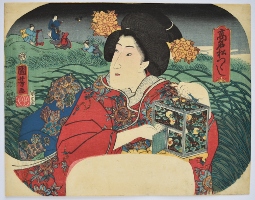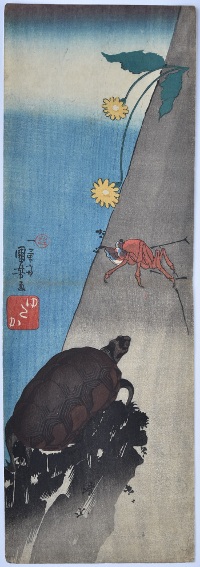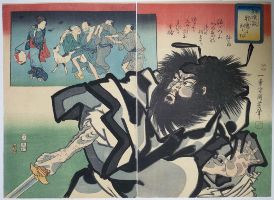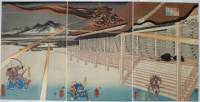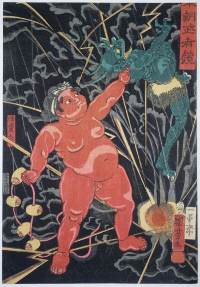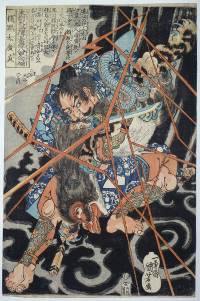Utagawa KUNIYOSHI (1797-1861)
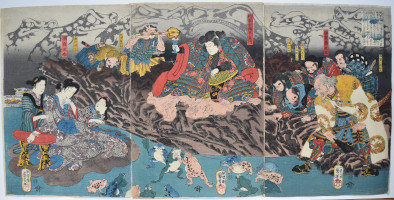
Click here to view image full size.
A triptych showing Shoguntaro Taira Yoshikado (centre), his sister Takiyasha-hime (left), and Yoshikado’s retainer, Iga Jutaro, watching magic toads wrestling. Huge toads loom above them. Shogun Taro Yoshikado mikata wo atsumen ga tame etc. Takiyasha-hime was known for her toad magic which she had gained from a scroll containing their secrets given to her by her brother. Published by Tsuru-ya Kiyemon, 1842-3. Robinson T.89.
Fine impression, colour and condition. Signed Ichiyusai and Chooro Kuniyoshi ga.
Status: Available
Utagawa KUNIYOSHI (1797-1861)
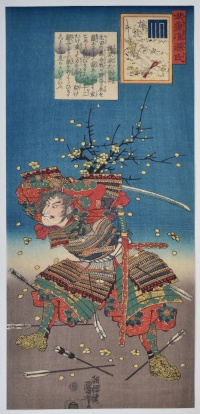
Click here to view image full size.
Chapter 32: Umegaye, “Plum brach” from an o-tanzaku set: Buyu nazorae Genji, “Heroic Comparisons for the Chapters of Genji.” Shows the Minamoto samurai Kajiwara Genda Kagesuye (1162-1200) fighting at Ikura-no-mori during the Genpai wars between the Taira and Minomoto clans. He has a plum branch stuck in his utsubo “quiver” in honour of his love Umegaye. The branch makes him an easy target for his enemies but he fights on regardless. Published by Ibaya Sensaburo, c 1843.
Very fine impression. Fine colour. Slightly trimmed at bottom, otherwise fine condition. Signed Cho-o-ro Kuniyoshi ga.
Status: Available
Utagawa KUNIYOSHI (1797-1861)
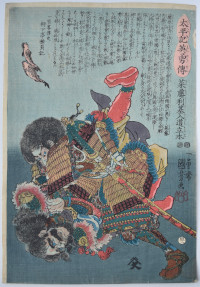
Click here to view image full size.
Saito Toshimoto nyudo Ryuhon in armour struggling with a Chinese brigand underwater. From the set Taiheiki yeiyuden, “Heroic Stories of the Taiheiki.” A history of the wars of the loyalist Nitta and Kusunoki families against the Ashikaga war-lords during the second quarter of the 14th century. But in fact the subject of this set of fifty prints is the civil war of the late 16th century. Censorship restrictions imposed in the 1840s prevented publishers from illustrating historical subjects from the Tensho era 1573-92 onwards, so the publishers circumvented this by slightly altering the names of the historical figures. Published 1848-9 by Yamamoto-ya Heikichi. Robinson S62.31. One of the best designs in the set.
Fine impression and colour. Very good condition. Signed Ichiyusai Kuniyoshi ga.
Status: Available
Utagawa KUNIYOSHI (1797-1861)
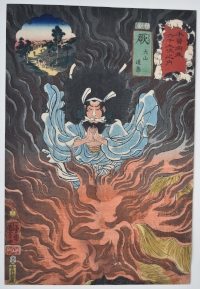
Click here to view image full size.
Inuyama Dosetsu, one of the eight dog heroes, enveloped in a conflagration. The heroes represent a Confucian ideal or Buddhist regulation and meet various adversaries in the epic Nanso satomi hakkenden, “Biography of the Eight Dogs” written by Takizawa Bakin between 1814 and 1842. Dosetsu is gifted with magic fire and is seen here with pine sprigs wrapped in paper clenched between his teeth. The subject represents Warabi Station (seen top left) from a set Kisokaido rokujuku tsugi, “Sixty-nine Stations along the Kisokaido.” In fact, a pun on the word warabi which can also mean “straw fire.” The bales can be seen bottom right. Published by Izutsuya Shokichi 1852. The best design from the set.
ga.
Fine impression and colour. Lightly backed and very slight vertical fold, otherwise very good condition. Signed Ichiyusai Kuniyoshi
Status: Available
Utagawa KUNIYOSHI (1798-1861)
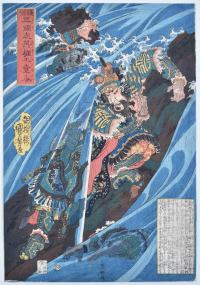
Click here to view image full size.
Cao Cao (Jap. Shuso) and Pang De (Jap. Hotoku) in the Han river during the battle with Guan Yu. From a set of Chinese warrior prints: Tsuzoku sangokushi eiyu no ichinin, “Heroes of the Popular History of the Three Kingdoms.” Published by Joshuya Kinzo, c. 1836. Robinson S10.8 (although only known as a key-block proof). Rare.
Superb impression. Very fine colour and condition. As the day it was printed. Signed Chooro Kuniyoshi ga.
Status: Available
Utagawa KUNIYOSHI (1797-1861)
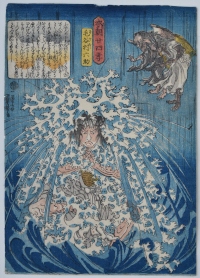
Click here to view image full size.
A fine chuban design showing Keyamura Rokusuke (aka Kida Magobee Muneharu), a famous farmer turned samurai and sumo wrestler of incredible strength, doing penance for seven days under the waterfall at Hikosan Gongen praying for his mother. Two Tengu watch from above. Waterfalls were one of the go-to-places to perform filial piety as they were considered to purify the soul in Shinto/Buddhist culture. From a set Honcho nijushiko, “Twenty-four Paragons of Filial Piety of our Country.” Published by Murataya Tetsu, 1843-6.
Fine impression and colour. Small nick out of top, otherwise very good condition. The signature Ichiyusai Kuniyoshi ga is on the extreme left edge and is often trimmed.
Status: Available
Utagawa KUNIYOSHI (1797-1861)
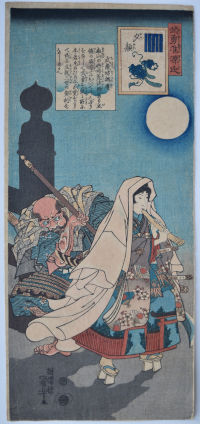
Click here to view image full size.
An o-tanzaku print, Yugao chapter from the fifty-four chapters of Genji, the Genji Monogatari. A tenth century romance written by Murasaki Shikibu. From a set Buyu nazoraye Genji, “Heroic Comparisons for the Chapters of Genji.” In this case showing Benkei creeping up on Ushiwaka on Gojo Bridge in Kyoto. The story relates how Benkei only needs one more blade to add to the 999 he has wrenched from samurai attempting to cross the bridge in order to fashion an invincible weapon. Benkei loses the fight and becomes Yoshitsune’s loyal retainer. Published by Ibaya Sensaburo, c. 1843.
Fine impression and colour. Very good condition. Signed Cho-o-ro Kuniyoshi ga.
Status: Available
Utagawa KUNIYOSHI (1797-1861)
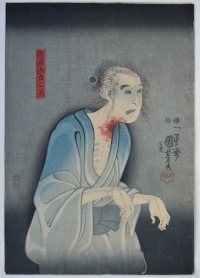
Click here to view image full size.
Ichikawa Kodanji IV as the ghost of Asakura Togo in the play Higashiyama Sakura zoshi, “The Story of Sakura of Higashiyama.” Based on historical events in 1653 with the characters’ names changed (Asakura Togo was actually Sakura Sogoro). The story tells of a village chief who was forced to witness the beheading of his sons before being crucified by the cruel samurai Lord Hotta Kozuki, after he had protested at the levy of unfair taxes. Sakura’s ghost returns to haunt Hotta’s castle. In fact the left sheet of a diptych. However, nearly always sold as a single sheet as the other side does not marry up, is undistinguished and was probably sold separately. Published by Sumiyoshi Masagoro, 1851. Beside the signature is the seal shita-uri, “low sale” meaning it was sold “under the counter” due to censorship laws prevalent at the time. This is the very rare first edition with the carver’s seal Hori Take, Yokokawa Takejiro, to the right of the publisher’s seal on the left. This was removed on later editions. One of the great ghost prints.
Fine impression, colour and condition with gum applied to the eyes (only found on the first edition).Signed Ichiyusai Kuniyoshi ga.
Status: Available
Utagawa KUNIYOSHI (1798-1861)
Click here to view image full size.
Morozumi Masakiyo, Lord of Bungo, and retainer of the Takeda being blown up by a cannonball or landmine whilst committing suicide with his sword. The best design from a set Koetsu yusho den, “Biographies of Brave Generals from the Provinces of Kai and Echigo.” The series shows heroic acts during battles that took place between the troops of Takeda Shungen of Kai Province and Kenshin Tora of Echigo Province during 1553-1564 at Kawanakajima. Published by Sumiyoshiya Masagoro, c 1849. Illustrated in colour, Robinson, Kuniyoshi The Warrior-Prints, Phaidon, 1982, pl. 20, S63.9 and elsewhere. One of Kuniyoshi’s finest oban designs.
Very good impression. Some oxidation, otherwise very good colour and condition. Signed Ichiyusai Kuniyoshi ga.
Status: Available
Utagawa KUNIYOSHI (1797-1861)
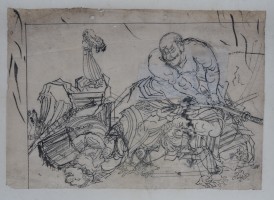
Click here to view image full size.
An original drawing, sumi on thin paper laid onto Japanese paper, 6.5 x 9.25 in; 15.9 x 23.5 cms. A heavily muscled individual (Benkei ?) dispatching two adversaries. Sold “as is” with all imperfections common to surviving drawings. Two areas of pentimenti.
Status: Available
Utagawa KUNIYOSHI (1797-1861)
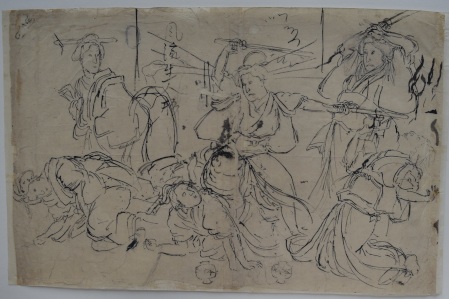
Click here to view image full size.
A fine large original drawing, sumi on thin paper, 12 x 18.5 in; 30.4 x 47 cms. Shows battling women holding what appear to be wooden swords. Two seals at the bottom which appear to be the publisher Honmo who published 1855-56. Provenance: Ex collection Dr. Julius Kurth (1870-1949), an eminent scholar who wrote extensively on Japanese and Chinese art.
Sold “as is” but in good condition.
Status: Available
Utagawa KUNIYOSHI (1797-1861)
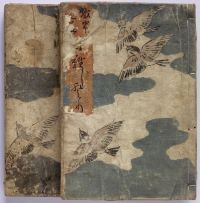
Click here to view image full size.
2 vols. complete: Kanjaku tsuizen hanashidori, “The Liberated Birds: A Memorial Book for Kanjaku.” A memorial book for the actor Nakamura Utaemon who died in 1852. He had the literary name of Kanjaku, meaning ”playing with sparrows” and the covers and many illustrations allude to this custom of releasing birds at funerals. Vol. 1: 1st preface , 3pp. giving the biography of Utaemon IV; poem 1p. 3 sheets: calligraphy (in ishizuri), 1p.; illustrations in colour, 5pp. signed on first page Toyokuni (III). Sheets 1-8: 2nd preface, 5pp., remaining pp. text, poems and colour illustrations. Sheets 1-75 with 15 single-page and 62 double-page illustrations in sumi and light colour. Inside back cover: colophon dated Kaei 5 (1852). Vol. 2: 110 sheets of text, poems, and illustrations. 38 single-page and 50 double-page illustrations (many in colour and includes a double-page illustration by Kuniyoshi). Last page, colophon, dated Kaei 5 (1852). Original covers with clouds and sparrows. Some soil and minor damage. One title slip missing and other damaged. Contents extremely good.
Status: Available
Utagawa KUNIYOSHI (1797-1861)
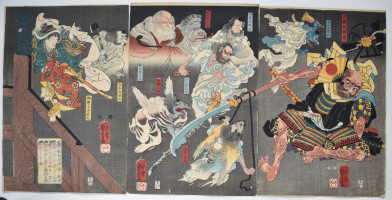
Click here to view image full size.
A triptych showing the famous battle on Gojo Bridge. The story relates how Benkei only needs one more blade to add to the 999 he has wrenched from samurai attempting to cross the bridge in order to fashion an invincible weapon. He meets Ushiwaka Maru (Minamoto no Yoshitsune’s childhood name) and challenges him to a fight on the bridge. Yoshitsune is aided by Sojobo, King of the Tengu (white-bearded in the centre) and other yamabushi tengu. Benkei loses the fight and becomes Yoshitsune’s loyal retainer. Published by Enshuya Hikobei, 1847-50. Robinson T194.
Fine impression, colour and condition. A lovely copy of this triptych. Signed Ichiyusai Kuniyoshi ga.
Status: Available
Utagawa KUNIYOSHI (1797-1861)
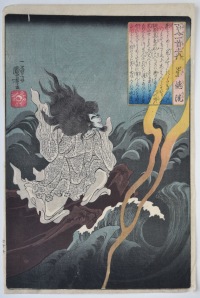
Click here to view image full size.
A poem by the celebrated poet Sutoku-in from the series Hyakunin isshu no uchi, “One Hundred Poems for One Hundred Poets” which was compiled in 1235 by Fujiwara Teiki (1162-1241). Shows the exiled Emperor Sutoku (1119-64) standing on a rocky outcrop above turbulent rapids. His wrath causes a thunderstorm with lightening. One of the very best designs from the set. Published by Ebisuya Shoshichi, Ebine, 1840-42. Only 58 of the 100 prints are known. Various translations of the poem exist, here is one:
Because the current is swift
Even though the rapids
Blocked by a boulder
Are divided, like them, in the end
We will surely meet, I know
Very fine impression. Fine colour. Very good condition. Signed Ichiyusai Kuniyoshi ga.
Status: Available
Utagawa KUNIYOSHI (1797-1861)
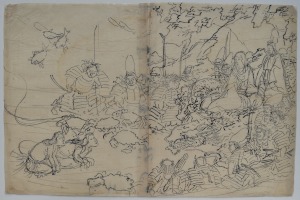
Click here to view image full size.
A fine large original drawing, sumi on thin paper, 12 x 18 in; 30.4 x 45,7 cms. Shows two awabi divers surrounded by crabs kneeling before a figure – possibly Empress Jingu – seated behind a dragon and surrounded by samurai. Provenance: Ex collection Dr. Julius Kurth (1870-1949), an eminent scholar who wrote extensively on Japanese and Chinese art.
Sold “as is” but in good condition.
Status: Available
Utagawa KUNIYOSHI (1797-1861)
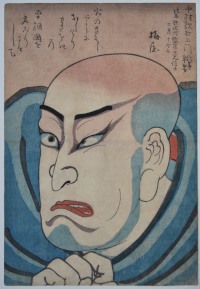
Click here to view image full size.
A dramatic shini-e (“memorial picture”) of the kabuki actor Nakamura Utaemon IV. Unsigned, as is usual with this sort of print, but the attribution to Kuniyoshi is certain: An original Kuniyoshi preparatory drawing for this print exists in the Rijksmuseum, Leiden (3513-663). Utaemon is shown in the role of Taira Kiyomori, the leader of the Taira Clan, seen here dressed as a monk. The print gives the date of his death as 17/2/1852. The tanka poem, above, is by Kuniyoshi’s friend the poet Umeya Kakuju (Murota Matabei).
Fine impression and colour. Slight trimming and centre fold, otherwise very good condition.
Status: Available
Utagawa KUNIYOSHI (1797-1861)
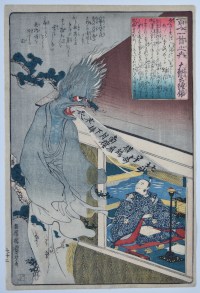
Click here to view image full size.
The poet Dainagon Tsunenobu (1016-97), seated at the window of his study having recited his most famous poem which speaks of the evening breeze in Autumn, is visited by an enormous ghost who screams a poem by the Chinese poet Bai Juyi (Jap: Hakuraten). From a set Hyakunin isshu no uchi, “One Hundred Poems by One Hundred Poets.” A compilation by the celebrated poet Fujiwara Teika in 1235. Only 58 of the set are known published by Ebine c 1840-42. A number of variant impressions exist of this design with the apparition printed either much darker or lighter, or the background darker and other minor differences. These all appear to be contemporaneous as the printers experimented. This impression appears to be the most successful. A fine design from an underrated set.
Fine impression, colour and condition. Signed Chooro Kuniyoshi ga.
Status: Available
Utagawa KUNIYOSHI (1797-1861)
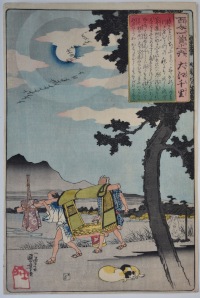
Click here to view image full size.
A poem by the celebrated poet Oe no Chisato from the series Hyakunin isshu no uchi, “One Hundred Poems for One Hundred Poets” which was compiled in 1235 by Fujiwara Teiki (1162-1241). Shows two porters with an empty palanquin beneath a haloed moon. One of the best designs from the set. Published by Ebisuya Shoshichi, Ebine, 1840-42. Only 58 of the 100 prints are known. Various translations of the poem exist, here is one:
Looking at the moon
Thoughts of a thousand things
Fill me with sadness –
But autumn’s dejection
Does not come to me alone
Fine impression and colour. Very good condition. Signed Ichiyusai Kuniyoshi ga.
Status: Available
Utagawa KUNIYOSHI (1797-1861)
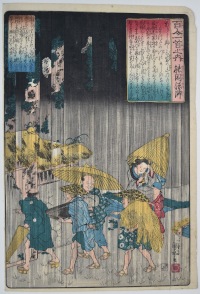
Click here to view image full size.
A poem by the celebrated poet and monk Noin-hoshi from the series Hyakunin isshu no uchi, “One Hundred Poems for One Hundred Poets” which was compiled in 1235 by Fujiwara Teika (1162-1241). A group of travellers are caught in a torrential downpour. One of the best designs in the set published by Ebisuya Shoshichi, Ebine, 1840-42. Only 58 of the 100 are known. Various translations of the poem exist, here is one:
The maples and leaves
Of Mount Mimura –
Making the Tatsuta River
A fine brocade
Very fine impression. Fine colour. Slight nibbling on one margin, otherwise fine condition. Signed Ichiyusai Kuniyoshi ga.
Status: Available
Utagawa KUNIYOSHI (1797-1861)
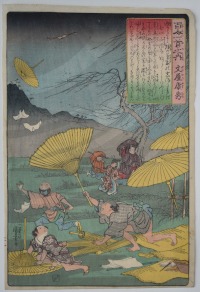
Click here to view image full size.
A poem by the celebrated poet Bunya no Yasuhide from the series Hyakunin isshu no uchi, “One Hundred Poems for One Hundred Poets” which was compiled in 1235 by Fujiwara Teika (1162-1241). The poet in the background watches as a fierce wind blows away some of the umbrellas that are being made. One of the best designs in the set published by Ebisuya Shoshichi, Ebine, 1840-42. Only 58 of the 100 are known. Various translations of the poem exist, here is one:
The mountain wind in autumn time
Is well called “hurricane”;
It hurries canes and twigs along,
And whirls them o’er the plain
To scatter them again
Very fine impression. Fine colour. Slight nibbling of border but otherwise fine condition. Signed Ichiyusai Kuniyoshi ga.
Status: Available
Utagawa KUNIYOSHI (1797-1861)
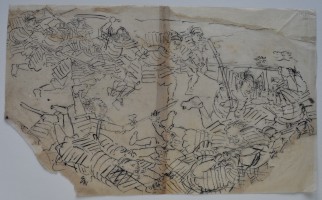
Click here to view image full size.
A large original drawing, sumi on thin paper, 12 x 20.5 in; 30.5 x 52 cms. Shows a battle between two armies. Provenance: Ex collection Dr. Julius Kurth (1870-1949), an eminent scholar who wrote extensively on Japanese and Chinese art. Sold “as is” with all imperfections.
Status: Available
Utagawa KUNIYOSHI (1797-1861)
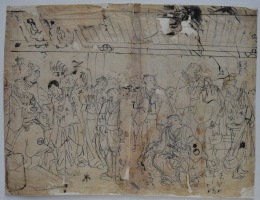
Click here to view image full size.
A large original drawing, sumi on thin paper, 15 x 20 in; 38 x 51 cms. Shows a large group of actors in front of a theatre. Most likely two sheets for an intended triptych. There appears to be the publisher’s seal Kiya Sojuro brushed-in at the bottom who was active c 1851-1904. Provenance: Ex collection Dr. Julius Kurth (1870-1949), an eminent scholar who wrote extensively on Japanese and Chinese art. Sold “as is” with all imperfections.
Status: Available
Utagawa KUNIYOSHI (1797-1861)
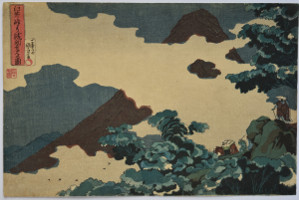
Click here to view image full size.
Travellers viewing Mount Asama. Usui-toge yori Asama o miru zu, “A View of Mount Asama from Usui Pass.” From Kuniyoshi’s best landscape set. Of the utmost rarity with most extant impressions differing. This and the impression in the Museum of Fine Arts, Boston, are similar, without the smoke coming from the cone of Asama (the most active volcano on Honshu). Other impressions are in: The British Museum, 1948, 0410, 0. 108, which has gradation up the left side of the mountain; the Metropolitan Museum of Art, JP 1424, which has gradation down from the summit; and Worcester Art Museum which is similar to the Mets, 1901. 692. Published by Yamaguchiya Tobei, c. 1836.
Very good impression, colour and condition. Signed Ichiyusai Kuniyoshi ga.
Status: Available
Utagawa KUNIYOSHI (1797-1861)
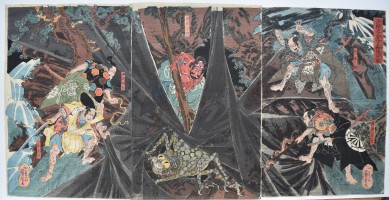
Click here to view image full size.
A rare early Kuniyoshi triptych, Minamoto no Yorimitsu no Shitenno tsuchigumo taiji no dzu, showing Minamoto no Yorimitsu (Raiko) and his loyal retainers: Watanabe no Tsuna, Usui no Sadamitsu, Sakata no Kintoki and Urabe no Suetake killing the giant “Earth Spider.” Numerous versions exist of this story but basically Raiko and his followers have to tackle various horrendous apparitions in a cave within the hill Kagura ga oka near Kyoto, eventually to be faced by a beautiful woman who envelops Raiko in cobwebs. He slays her and her body turns into a spider, the head being twenty-five feet long and eyes shining like the sun and moon. He cuts off the beast’s head and the carcase reveals the many bodies devoured by it. Published by Maru-ya Seijiro, c 1838. Robinson T46 and illustrated in colour, Kuniyoshi, B.W.Robinson, Phaidon 1982, plate 37.
Very good impression and colour. Minor creasing, otherwise very good condition. Signed Ichiyusai Kuniyoshi ga.Very good impression. Slight fading, otherwise good colour. Very good condition. Signed Ichiyusai Kuniyoshi ga.
Status: Available
Utagawa KUNIYOSHI (1797-1861)
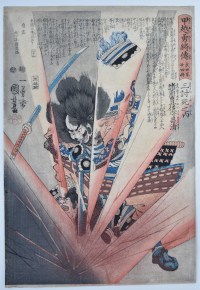
Click here to view image full size.
The general Morozumi Masakiyo, Lord of Bungo and a retainer of the Takeda Clan (Shingen of Kai Province) in a battle with the Uesugi Clan (Kenshin of Echigo Province), The wars taking place between 1553 and 1563. From a set Koetsu yusho den, “Stories of Courageous Generals of the Provinces of Echigo and Kai.” Masakiyo is shown committing suicide by inserting his sword into his mouth while being blown up by a land-mine. As with so much in Japan, the land-mine originated in China from early times. Published by Sumiyoshiya Masagoro, c 1848-9. One of the “three great deaths” of these wars.
Very good impression with extensive sprayed pigment around the exploding mine. Slight fading, otherwise very good condition. Signed Ichiyusai Kuniyoshi ga.
Status: Available
Utagawa KUNIYOSHI (1797-1861)
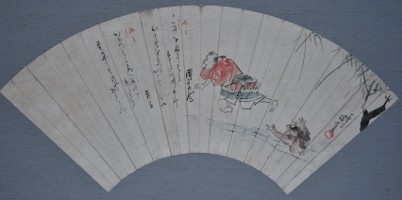
Click here to view image full size.
An original fan painting, 6.5 x 17.5 in; 16.5 x 44.5 cms. Sumi and colour on treated paper. Shows a kappa appearing from the Sumidagawa and terrifying a man who runs for his life. Kappa were amphibious creatures found in rivers and ponds. Their bodies were covered with a horny carapace like a tortoise, with scaly legs and four frog-like webbed feet. They loved to wrestle and were known to attack humans – especially children, and horses. However, they could be tricked as they were very polite. If you bowed to a kappa he invariably bowed back, and as their source of power lay in a pool of water contained in a depression in the head, this would be spilt and they became immobilized. Laid around the edge onto Japanese board with the ribmarks evident as it has been dismounted from an ogi or folding fan. Signed Ichiyusai Kuniyoshi ga with hand-painted toshidama seal. Good condition.
Status: Available
Utagawa KUNIYOSHI (1797-1861)
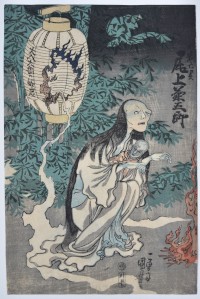
Click here to view image full size.
The actor Onoye Kikugoro III as the ghost of Oiwa from a production of Yotsuya kaidan at the Morita Theatre, 1836. Probably the most famous Japanese ghost story. It was adapted by the playwright Tsuruya Nanboku IV for his friend Kikugoro in 1825. The left panel of a diptych (the right panel being boring and usually ignored). A scene on Snake Mountain showing Oiwa, disfigured by poison, emerging from a burning lantern to haunt her husband, Tamiya Lemon, who had murdered her father. Published by Kawaguchi-ya Chozo, 1836.
Very good impression, colour and condition. Signed Ichiyusai Kuniyoshi ga.
Status: Available
Utagawa KUNIYOSHI (1797-1861)
Click here to view image full size.
Gempei Yashima o-kassen, the great battle of Yashima in 1184. Shows Yoshitsune’s famous “eight-boat leap” (centre), Noritsune (left), and Benkei on the large boat (right). Published by Kawaguchiya Uhei, c. 1839-41.
Very good impression and colour. Edge repair top left sheet, otherwise very good condition. Signed Ichiyusai Kuniyoshi ga.
Status: Available
Utagawa KUNIYOSHI (1797-1861)
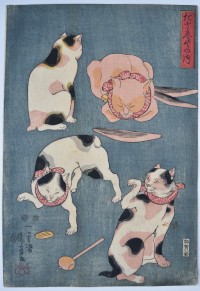
Click here to view image full size.
Four cats, the first sheet of a triptych Tatoe zukushi no uchi, “Proverbs Illustrated by Cats.” Examples being: “Bonito to a cat,” “Coin to a cat,” “Not even a cat would eat it.” Published 1852 by Kagaya Yasubei. Bob-tailed and calico cats were common in the Edo period. It is well known that Kuniyoshi was a cat-lover and Yoshimune, one of his pupils, relates how they were allowed to run around his studio and when a cat died he would have it sent to a nearby temple. He also had a Buddhist altar erected in his home for his deceased cats. Another pupil of Kuniyoshi’s was Kyosai and he depicts the chaotic studio with cats and other artists milling around in his illustrated book Kyosai kadan, part II, vol. 3, of 1887. Of the utmost rarity: I have not catalogued another sheet from this triptych in 50 years.
Very fine impression and colour. One minor blemish, otherwise very fine condition. Signed Ichiyusai Kuniyoshi ga. (All the cats have blind-printing on their coats which is not apparent on the illustrated examples of this print. Possibly due to the reproductive process.)
Status: Sold
Utagawa KUNIYOSHI (1797-1861)
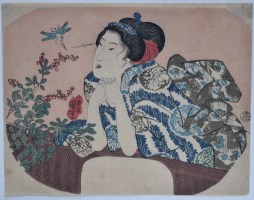
Click here to view image full size.
An uncut fan print showing a beauty leaning on a fence and watching a dragonfly hovering above a flowering plant. Published by Maruya Jinpachi, c early 1840s. Rare and very attractive.
Very good impression, colour and condition. Signed Ichiyusai Kuniyoshi ga. ga.
Status: Sold
Utagawa KUNIYOSHI (1797-1861)
Click here to view image full size.
An uncut fan print from a series: Koumei matsu tsukushi, “ Famous Kinds of Pine.” A euphemism for young beauties. One here shown holding a cage for fireflies being caught by children in the background. Published by Maruya Jinpachi, 4/1854.
Fine impression, colour and condition. Signed Kuniyoshi ga.
Status: Sold
Utagawa KUNIYOSHI (1797-1861)
Click here to view image full size.
A chutanzaku print showing a tortoise, crab and dandelions from an untitled series of ten prints showing water creatures originally published two-to-a-sheet. Of the utmost rarity: Arguably the most difficult Kuniyoshi set to find. It appears there are only three other impressions known of this design: The Bidwell Collection, Springfield Museum of Fine Arts, illustrated in their catalogue, Utagawa Kuniyoshi, 1980, no 72 (60.D05.197); The Japan Ukiyoe Museum, uncut sheet with lobster and small fish, illustrated in Utagawa Kuniyoshi Exhibition Catalogue, 1996, p. 154, no. 208; and Kuniyoshi, Iwakiri Yuriko, Hotei publishing, 2013, p. 135, no. 109 (possibly from a French collection). This actual impression (making the fourth impression known) is illustrated in Kuniyoshi, Juzo Suzuki, 1992, no. 445. Ex collections J. Schedel (seal next to signature) and Sawai Suzuichi. This impression has no publisher’s seal nor does another design of a carp from the set illustrated in Heroes & Ghosts, Robert Schaap, Hotei publishing, 1998, p. 213, no 240. That is a very fine impression (as is this) and possibly they are proof impressions. Published by Tsujiokaya Bunsuke (Kinshodo), c 1837. For the full set illustrated see the Springfield catalogue mentioned above. Excessively rare.
Very fine impression with woodgrain showing on all blocks. Fine colour. Centre fold (evident if held to light), otherwise very good condition. Signed Ichiyusai Kuniyoshi ga with Yutaka seal.
Status: Sold
Utagawa KUNIYOSHI (1797-1861)
Click here to view image full size.
An extremely rare diptych, Shoki-san jaki ni sokko, “Shoki-San, Quick-Acting Medicine to Remove Evil Spirits.” Images of Shoki were used to ward off evil spirits and illness, especially during the Boys’ Festival. Published 1858 by Enshuya Hikobei. Provenance: Purchased from me in 1994.
Extremely fine impression. Fine colour and condition. Signed Ichiyusai Kuniyoshi fude with Yutaka seal.
Status: Sold
Utagawa KUNIYOSHI (1797-1861)
Click here to view image full size.
A triptych Akazawa-yama o-sumo showing the most famous sumo match in Japanese history between Kawazu Saburo Sukeyasu and Matano Goro Kagehisa at Akazawa mountain. Also famous as Kawazu used a new sumo hold wrapping a foot around his opponent’s leg and encircling the neck with one arm, a manoeuvre that became known as the Kawazu hold. The event took place in 1176 before Shogun Minamoto Yoritomo where Kawazu defeats the popular bully Matano. Subsequently Kawazu was murdered, quite unrelated to the bout. His sons swear revenge and their story becomes the Soga monogatari. Kawazu is shown here throwing Matano to the ground, the referee to the left. Published 1858 by Maruya Kyushiro. Robinson T353. Provenance: Purchased from me in 1994.
Superb impression and colour. One small thinned area, otherwise very fine condition. Probably the finest impression extant of this famous design. Signed Kuniyoshi ga and Ichiyusai Kuniyoshi ga.
Status: Sold
Utagawa KUNIYOSHI (1797-1861)
Click here to view image full size.
A triptych showing the famous archer Minamoto no Yorimasa preparing to shoot the monster Nue on the roof of the Shishinden Palace. The story relates how in 1153 the sixteen year old Emperor Konoe was having difficulty sleeping due to the shrieks and scratchings emanating from the palace roof. Guards informed him that a black cloud descended there every night. Yorimasa was called upon to investigate and he brought down the beast – a composite creature, part monkey, badger, tiger, dragon and snake which was duly despatched by his retainer Hironao no Hayata (Tadazumi no Hayata). Subsequently Konoe sleeps soundly and rewards Yorimasa with a fine sword and a court beauty Yorimasa loves. An exceptional design published 1842-3 by Yamashiroya Shinroku. Robinson T112. Provenance: Purchased from me in 1994.
Fine impression, colour and condition. Signed Ichiyusai Kuniyoshi ga.
Status: Sold
Utagawa KUNIYOSHI (1797-1861)
Click here to view image full size.
Kwaido Maru (Kintoki) seizes Raijin, the Thunder God, with one hand while holding his thunder drums with the other. A thunderbolt falls to earth causing flashes of lightning. A fine and rare set: Honcho musha kagami, “Mirror of Warriors of our Country.” The set published by Tsujioka-ya Bunsuke, 1855. Robinson S87.6.
Fine impression. Slightly trimmed, otherwise very good condition. Signed Ichiyusai Kuniyoshi ga.
Status: Sold
Utagawa KUNIYOSHI (1797-1861)
Click here to view image full size.
Hironao no Hayata (Tadazumi no Hayata), Yorimasa’s retainer (see the triptych by Kuniyoshi of the same subject on this update), grappling with the composite beast Nue on the roof of the Shishinden Palace. Forked lightning bounces around him. One of the best designs from Honcho Suikoden goyu happyaku-nin no hitori, “Eight Hundred Heroes of our Country’s Suikoden, One by One.” Published by Kagaya Kichiemon, 1830-31.
Very good impression and colour. Slight trimming, otherwise very good condition. Signed Ichiyusai Kuniyoshi ga.
Status: Sold
Utagawa KUNIYOSHI (1797-1861)
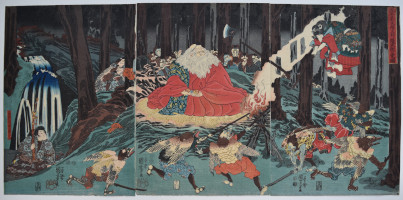
Click here to view image full size.
A triptych showing Ushiwaka Maru (Minamoto no Yoshitsune’s childhood name), attended by Kisanda, practising fencing with the karasu or “crow” tengu in a forest glade on Mt. Kurama, north of Kyoto. His training in martial arts is being supervised by a white-bearded yamabushi tengu, Sojobo, King of the Tengu. (The yamabushi were followers of Shugendo– a shamanistic mountain ascetism.) Yoshitsune (1159-1189) is the best known Japanese warrior and a popular subject for Japanese artists and craftsmen. Famous for exploits such as the battle on Gojo Bridge with Benkei and the battle of Dan-no-ura. Published by Enshuya Hikobei, 1851-2. Robinson T264.
Fine impression. This is the first state with gradation on the rocks top left. Fine colour. Very good condition. Signed Ichiyusai Kuniyoshi ga.
Status: Sold
Utagawa KUNIYOSHI (1797-1861)
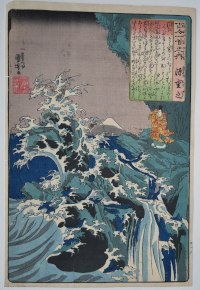
Click here to view image full size.
A poem by the celebrated poet Minamoto no Shigeyuki from the series Hyakunin isshu no uchi, “One Hundred Poems for One Hundred Poets” which was compiled in 1235 by Fujiwara Teika (1162-1241). Shows the poet on a craggy outcrop with waves crashing around him; Fuji in the distance. One of the best designs in the set published by Ebisuya Shoshichi, Ebine, 1840-42. Only 58 of the 100 are known. Various translations of the poem exist, here is one:
Waves that beat against the rocks
Fanned by a fierce wind –
It is I alone
Who breaks, those times
When I think of her
Very fine impression. Fine colour and condition. Signed Ichiyusai Kuniyoshi ga. Hiroshige ga.
Status: Sold
Utagawa KUNIYOSHI (1797-1861)
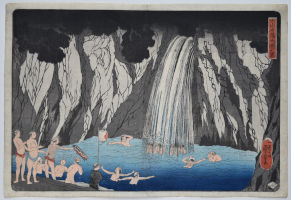
Click here to view image full size.
A view of pilgrims bathing in the Roben waterfall at the Afuri (Shinto) shrine, Oyama in Segami Province. Oyama sekison otaki no zu. This happened during the summer months and was considered a purification ritual. Oyama is a sacred mountain near the Izu peninsula and a short distance from Kamakura and Enoshima. Kuniyoshi designed another oban of this subject as well as two triptychs. Published by Wakasaya Yoichi, 1839-40. It has been suggested that the tattooed figure, on the left, holding a lantern with Kuniyoshi inscribed on it may be Kuniyoshi himself.
Very good impression and colour. Slight centre fold and expertly repared wormage. Signed Ichiyusai Kuniyoshi ga.
Status: Sold
